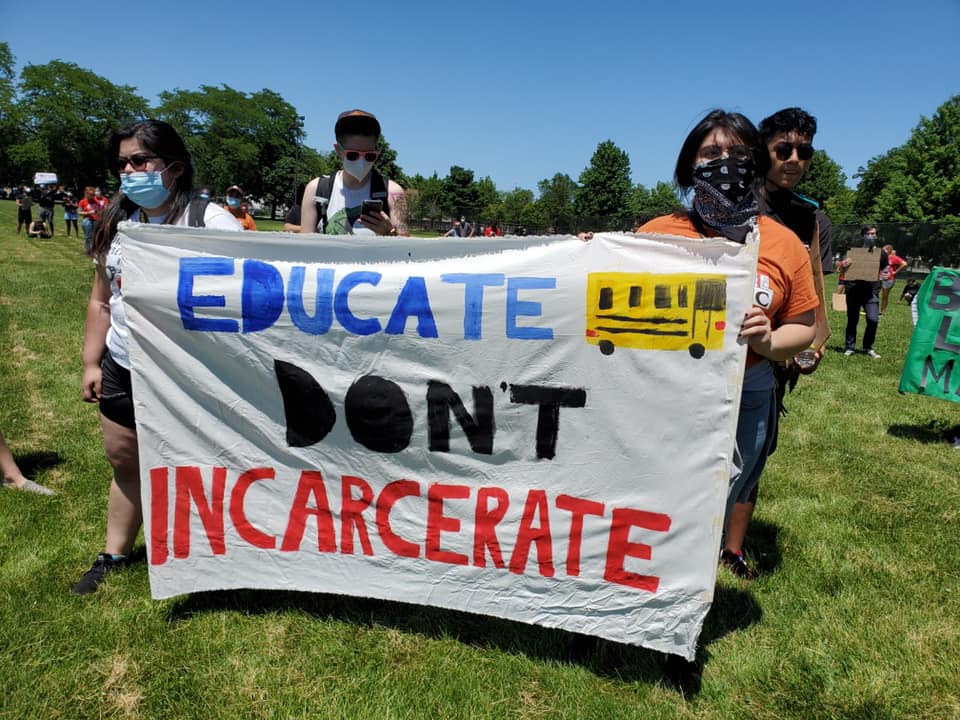Two weeks ago, I thought I heard a strange firework near my house in Logan Square. A few minutes later, I saw police surrounding my block. A 10-year old girl, who was inside of her house – the safest place she could be – had been killed by a stray bullet fired by a young person.
As our city grapples with rising summer violence and discusses defunding the police from public schools, it’s clear to me that decision-makers do not see what we see, and what the data shows. Police presence does not reduce community violence.
CPD Did Not Stop Sexual Violence In CPS
As a Chicago Public Schools parent and a survivor of gender-based violence, I’ve seen how the presence of police did not reduce the rates of sexual violence in schools. In the last 10 years, CPS officials increased police presence in schools. During that same time period, over 500 CPS students experienced horrific acts of sexual assault, averaging an incident a week.
Despite heavy police presence in the South and West sides of Chicago, those communities continue to see more sexual assaults than the rest of the city. The carceral system has done even less to deter and prevent gender-based violence. In fact, the rates of recidivism are higher among individuals labeled as sex offenders.
In my neighborhood, gang and gun violence remains a continuous problem. With $1.76B allocated to the police in Chicago’s 2020 budget, this violence should have ceased completely. As a community leader and an ally to this next generation, I believe we are better off reinvesting those funds back into our communities, starting with the youth. By defunding police, starting with CPS, the city has an opportunity to begin investing in initiatives that have the potential to prevent community violence like sexual violence for the next generation.
Sex Ed Gives Youth Tools To Disrupt Violence
In 2019, my fellow Healing to Action survivor-leaders and I launched a grassroots campaign, SexEd Works, to reform sex education in CPS. We realized that having access to life-saving prevention education could give students accurate, age-appropriate skills and knowledge to promote their sexual well-being, including learning about consent and healthy relationships.
Chicago Public Schools has repeatedly slashed programs that support the development of youth like the arts and sex ed. For instance, over 70% of students do not receive comprehensive sexual education in Chicago. Many of these students live on the South and West sides of the city. Despite a curriculum that mirrors national standards, CPS has failed to ensure teachers receive high-quality training and on-going professional development; develop clear policies that support educators; ensure caregivers have the tools to reinforce the lessons at home; and develop a strong curriculum that is inclusive of diverse learners and the LGBTQ community.
Having these tools and skills have shown to lead towards a reduction in gender-based violence over the life of a young person. Moreover, skills developed through learning consent and healthy relationships like communication, listening, acceptance, and understanding, are skills applicable across the life of a young person and can ultimately disrupt other forms of community violence like gang and gun violence.
I have a lot of questions about this young person who shot and killed this innocent girl. But my main question beyond all others is why did he feel like he had to shoot a gun? If we really want to prevent violence, that is the question we need to understand. We must dig deeper into the root causes of our community violence.
One way to begin is by investing in counselors, restorative justice practitioners, and most importantly, the education to ensure young people and their families can develop healthy relationships in our communities. Because to create change for the next generation, we need to invest in knowledge, not police.
